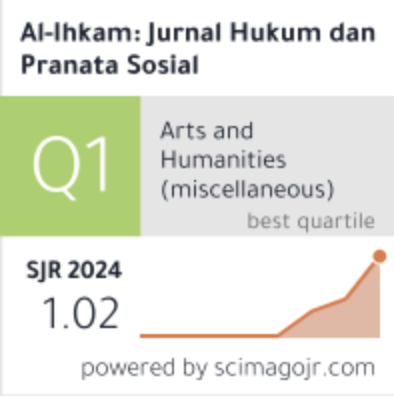Legal Protection for Disputing Parties through the Aceh Customary Court
 Abstract views: 575
,
Abstract views: 575
,
 PDF downloads: 445
PDF downloads: 445
Abstract
Article 13 paragraph (1) of the Aceh Qanun Number 9 of 2008 on the Development of Customary and Indigenous Life discussing customary disputes mentions that ideally, the customary court can solve customary disputes. However, sometimes, it can not solve all cases and provide legal protection for all disputing parties. This study aims to explain the process of resolving private disputes through the customary court and providing legal protection for the parties. This type of research was empirical juridical with qualitative analysis. The results showed that a dispute resolution process could be done through two models. First is through customary judicature using formalized procedures by involving customary instruments. Second is using positive law indicator by not providing legal protection for the parties. Certain parties will typically file a lawsuit again after getting the customary court's decision. This research suggests collaboration among the Government, the Police, and the Customary Assembly in consistently promoting the customary court and improving the quality of customary instruments.
Downloads
References
Agus Budi Wibowo, “Budaya Damai dalam Masyarakat Aceh,” http:// agusbwaceh. Blogspot. co.id/2009/08/ budaya-damai-dalam-masyarakat-aceh.html, (accessed on April 30, 2018).
Badruzzaman Ismail, Bunga Rampai Hukum Adat, Banda Aceh: Majelis Adat Aceh, 2003.
Bushar Muhammad. Asas-asas Hukum Adat. Jakarta: Pradnya Paramita, 2003.
Eva Achjani Zulfa, “Keadilan Restoratif dan Revitalisasi Lembaga Adat di Indonesia”. Jurnal Kriminologi Indonesia, Volume. 6 Nomor II (August 2010).
Fauzi Saleh, Konsep Suluh dan Konstruksi Pendidikan Damai di IAIN Ar-Raniry: Kontribusi Kampus dalam Dakwah Perdamaian di Aceh, Banda Aceh: Yayasan Pena dan Ar-Raniry Press, 2007.
Hamdany, Deny. “Cultural System of Cirebonese People: Tradition of Maulidan in the Kanoman Kraton”. Indonesian Journal of Social Sciences, vol 4, no 1 (July, 2012).
Jawahir Thontowi, “Perlindungan dan Pengakuan Masyarakat Adat danTantangannya dalam Hukum Indonesia” Jurnal Hukum Ius Quia Iustum, vol. 20, no 1 (2013).
Lawrence M. Friedman, Sistem Hukum; Perspektif Ilmu Sosial(The Legal System; A Social Science Perspective), transl M. Khozim, Bandung: Nusa Media, 2009.
Mohd Koesno, Hukum Adat sebagai Suatu Model Hukum Historis, Bandung: Mandar Maju, 2002.
Mohammad Jamin, Peradilan Adat, Pergeseran Politik Hukum Perspektif Undang-Undang Otonomi Khusus Papua. Yogyakarta: Graha Ilmu, 2012.
Nurul Hakim. “Konflik Antara Al-‘Urf (Hukum Adat) dan Hukum Islam Di Indonesia” in Jurnal EduTech No 2 Vol (2017): 3, http://noorelhakim76@gmail.com. file:///C:/Users/ NOTEBOOK/Desktop/JURNAL%20ADAT.pdf. (diakses 12 Februari 2019).
Otje Salman Soemadiningrat, Rekonseptualisasi Hukum Adat Kontemporer. Bandung: Alumni, 2002.
Salim HS dan Erlies Septiana Nurbani, Penerapan Teori Hukum pada Penelitian Tesis dan Disertasi, Jakarta: Raja Grafindo Persada, 2014.
Satijipto Raharjo, Ilmu Hukum, Bandung: Citra Aditya Bakti, 2000.
Siswantoro Sunarso, Penegakan Hukum Psikotropika dalam Kajian Sosiologi Hukum, Jakarta: Raja Grafindo Persada, 2004.
Soerjono Soekanto, Faktor-Faktor yang Mempengaruhi Penegakan Hukum, Jakarta: Rajawali Pers, 2012.
Sudikno Mertokusumo, Penemuan Hukum, Bandung: Citra Aditya Bakti, 2009.
Sumarti M. Thahir, 23 Muslimah Kesayangan Rasulullah, Bandung: Alumni, 2002.
Taqwaddin Husin, et al, Mukim di Aceh Belajar dari Masa Lalu untuk Pembangunan Masa Depan, Yogyakarta: Diandra Pustaka Indonesia, 2015.
Yani Suryani, et al, Tempat Bersejarah Umat Islam, Jakarta: Luxima Metro Media, 2014.
Yuzna Zaidah, Penyelesaian Sengketa Melalui Peradilan dan Arbitrase Syari’ah di Indonesia, Yogyakarta: Aswaja Pressindo, 2015.
In order to be accepted and published by Al-Ihkam: Jurnal Hukum dan Pranata Sosial, author(s) submitting the article manuscript should complete all the review stages. By submitting the manuscript, the author(s) agreed to the following terms:
- The copyright of received articles shall be assigned to Al-Ihkam: Jurnal Hukum dan Pranata Sosial as the publisher of the journal. The intended copyright includes the right to publish articles in various forms (including reprints). Al-Ihkam: Jurnal Hukum dan Pranata Sosial maintain the publishing rights to the published articles.
- Authors are permitted to disseminate published articles by sharing the link/DOI of the article at Al-Ihkam: Jurnal Hukum dan Pranata Sosial. Authors are allowed to use their articles for any legal purposes deemed necessary without written permission from Al-Ihkam: Jurnal Hukum dan Pranata Sosial with an acknowledgment of initial publication to this journal.
- Users/public use of this website will be licensed to CC-BY-SA.



.png)
_1.png)


_page-00011.jpg)


